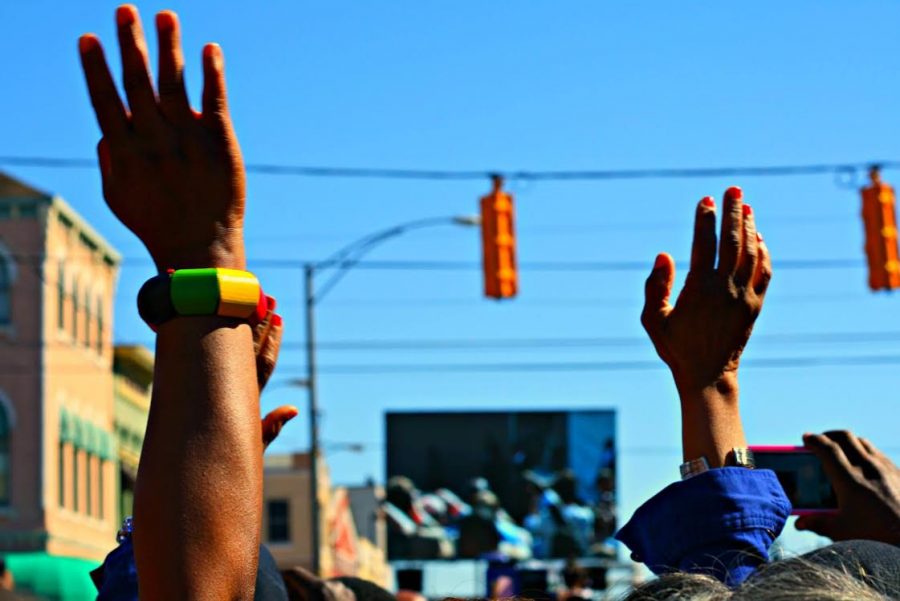UNA students address racial equality, celebrate Selma anniversary
March 12, 2015
Thousands gathered in Selma last weekend to commemorate the 50th anniversary of the Selma to Montgomery March that helped gain voting rights for African-Americans.
Among those present at the ceremony was President Barack Obama, who gave a speech addressing how far America has come in the advancement of racial equality.
“Because of campaigns like this, a Voting Rights Act was passed,” Obama said. “Political, economic and social f barriers came down, and the change these men and women wrought is visible here today in the presence of African-Americans who run boardrooms, who sit on the bench, who serve in elected office from small towns to big cities — from the Congressional Black Caucus to the Oval Office.”
He continued to say the Selma marchers gave courage to millions of Americans, and they led a nation, even though not one of them held any elected office. He said not only did the marches help the advancement of African-Americans, but Americans of all backgrounds.
“It’s absolutely fundamental that we continue to celebrate and reflect on the 50th anniversary of the Selma march and the Voting Rights Act,” said Scottie Hunter, news anchor and reporter for WVAS radio in Montgomery, who covered the Selma anniversary. “It’s a part of our history, not just in the U.S. but globally. It launched the fight for civil rights and equality.”
Hunter said one of the most impressive parts of the anniversary was the attendance. About 80,000 people went to Selma, which has a population of around 20,000, over the weekend.
“It was absolutely phenomenal,” he said. “As part of the working media, I got a little more access. There were people everywhere. I met people from all walks of life. There was a sense of togetherness. People were here to celebrate. They were also looking for a way forward in our country.”
Junior Caroline Bobo said she was fortunate to attend the anniversary gathering.
“It was amazing,” Bobo said. “I’ve never been in one place where so many people were gathered together under the same belief. There were thousands of people there.”
Hunter said the atmosphere of the event indicated the U.S. is moving toward racial equality.
However, there is still more work that needs to happen in the fight for equality, Obama said.
“Racism is still alive,” said senior Walter Hartley. “It’s just hidden.”
Hartley said people should not judge others solely based on race, but they need to find out what they have in common and also learn from each other’s differences.
Obama said the equality fight will progress, but likely never end.
“We have to recognize that one day’s commemoration, no matter how special, is not enough,” he said. “If Selma taught us anything, it’s that our work is never done.”
He then said it is a common mistake to say there is no more racism today, and said that he knows the march is not over and the race is not yet won.
“On one hand I believe that there has been a great deal of progress, and that’s a beautiful thing, but I also see us regressing in too many ways,” said Tori Bailey, general manager of WZZA. It is the only radio station in the Shoals with a primarily African-American target audience.
Bailey went on to say people need to continue to bring attention to events because they get people talking about issues.
Destiny Battles, president of UNA NAACP, said people can reach equality, but to do that they need to be self-aware, because a lot of times people deny racism and discrimination because they do not want to deal with it.
“Equality will be reached the day that every single person realizes it exists and does everything they can to put that behind them” Battles said.
Obama went on to say even though the Voting Rights Act was passed because of the marches, there are still many obstacles that get in the way to make it hard to vote.
Bailey said she has seen over the past few years more and more people are not getting out to vote like they should, and because of that she does not understand why there should be any more obstacles to get people to vote.
“There has to be a motive behind that kind of action,” she said.
Hartley said it is important to vote not only because of the fact 50 years ago African Americans could not vote, but because people are voting for the president, their representatives and the others who are running the country.
Battles said many people started to realize the importance of voting when Obama won the presidency in 2008.
“When you vote and put your opinion out there it matters,” she said. “There is somebody that is standing for exactly what you’re standing for. How can I change the world that I’m living in? Voting is the way to do that.”
Hunter said while an African-American being elected to the highest office is a sign of the country moving forward, there are still negative attitudes surrounding Obama based on his race.
“The VRA was about the right to vote, and so many people do not take advantage of that fundamental right,” he said. “But when you look at many of the criticisms President Obama has taken, it’s almost like we’ve taken a step back. The attitude shows that clearly we haven’t moved as forward as we thought.”
Bailey said everybody needs to go register to vote.
“Voting is the solution,” she said.


